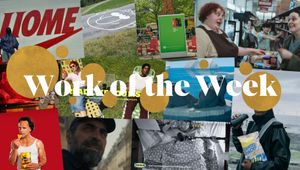
Why a Prosthetics Brand Is Highlighting the ‘Obstacle Course’ of Everyday Life at the Paralympics

As athletes from all over the world gather in Paris for the Paralympic Games, Ottobock, the global market leader in prosthetics, has unveiled a powerful and urgent campaign with the support of the International Paralympic Committee (IPC).
As a prosthetics brand, Ottobock knows that while we’re about to witness just what phenomenal things people with disabilities can achieve, even Paralympians face daily challenges that they shouldn’t – broken elevators, missing ramps, stairs, cobblestones, narrow doors, and prejudices. Despite one billion people (16% of the global population) living with disabilities, these obstacles persist.
Created by creative agency PRESENCE, Ottobock’s ‘Unofficial Discipline’ will be prominently featured throughout Paris during the Paralympic Games. The campaign includes slogans on billboards, posters, and video projections with headlines designed to capture public attention, such as:
"Can we break the record for breaking barriers?"
"You can’t rise to the top in a broken elevator."
"Inaccessibility won’t make it to the finish line."
These messages, along with a QR code inviting people to learn more about Ottobock’s global mission for accessibility, will be strategically displayed in inaccessible places such as staircases and by popular tourist attractions across Paris, likethe Eiffel Tower. The campaign will also live on social media platforms including YouTube, Meta and Google.
Already, more than 20 top Paralympic athletes (including the UK’s Samantha Kinghorn, USA’s Ezra Frech, Germany’s Léon Schäfer and Italy’s Bebe Vio) and more than 50 international users of Ottobock prosthetics are bringing the #UnofficialDiscipline movement to life – sharing their daily struggles on Instagram and TikTok, sparking a global social media movement for change.
Launched in Paris, the campaign is set to expand to other cities following the Paralympics.
LBB’s Alex Reeves spoke to Martin Wider, VP of global marketing for Ottobock, to find out more about the campaign.
LBB> Where did the idea for 'The Unofficial Discipline' begin?
Martin> It's all about observation, about empathy and listening to our Ottobock users – if you pay attention, the idea jumps out at you. You see barriers everywhere. It starts with broken elevators at the metro station, continues with staircases or big gaps at train stations. Once you're sensitised to the topic, the idea is everywhere. Then it's all about narrowing it down. We were supported by a great group of athletes and Ottobock users that gave us even more insights beyond the obvious. Without them, the campaign would have not been possible.
LBB> How did you get involved with the IPC?
Martin> As a long-term supporter and partner of the Paralympic Games, Ottobock has a close connection with the IPC, so naturally we approached them early on when coming up with the ‘Unofficial Discipline’. The IPC is incredibly influential when it comes to disability awareness, and their support lends a lot of credibility to the campaign, as well as ensuring we’re able to reach as many people as possible.

LBB> What were the main creative breakthroughs from the initial concept to all of the finished executions?
Martin> The insights from athletes and Ottobock users not only supported the campaign message but helped shape it and make it more personal. They saw a chance to spark a much-needed conversation. Not just with their followers but also with all the people who are fully unaware of the daily disciplines. And we couldn't agree more. In the end, change needs dialogue. And the ‘Unofficial Discipline’ is a great chance to start one.

LBB> How did you select the places to display these messages? What were the important decisions there?
Martin> Every day, people with disabilities face immeasurable challenges as they try to go about their lives. Taking public transport isn’t simply a matter of remembering when to get off the bus – it’s an exhausting obstacle course, which involves careful planning every step of the way. It’s mind-boggling to think about the fact that in 2024, fewer than 30% of New York subway stations are wheelchair accessible, while more than a third of people in the UK with visual impairments say they find public transport difficult to use – but this kind of everyday inequality goes unnoticed by the able-bodied population. With that in mind, for the Paralympics, we chose locations which were close to the Games’ official venues and were likely to catch tourists’ attention, as well as being difficult to access (often due to stairs).

LBB> How did you work with athletes to gather their personal hurdles? And how will you be using these stories?
Martin> The Ottobock team is incredibly privileged to have worked with Paralympic athletes for more than three decades – we run the official repair workshop on site during the Paralympic Games, which means that we’re the first port of call if any athlete has an issue with their prosthetics and wheelchairs, no matter the manufacturer. That means that for 30+ years, we’ve heard directly from athletes all over the world about the challenges that they face on a daily basis. Now we’re working with 20+ Paralympic athletes and 50+ Ottobock ambassadors to amplify their stories in their own words during the course of this campaign.
The campaign ‘Unofficial Discipline’ is following the success of the 2023 brand campaign ‘I Am a Mountain’, which portrayed the experience of the limb loss and limb difference community authentically through user-generated-content and led to a performance on the world's biggest stage, the Eurovision Song Contest. The campaign strengthened the visibility of people with disabilities worldwide – and has literally given them a stage in front of 162 million viewers. Our users' and ambassadors' feedback encouraged and inspired us to take a bold approach at this year's Paralympic campaign and we hope to spark a global conversation and movement with this.

LBB> How do you hope the campaign will live through the duration of the Paralympic Games and beyond?
Martin> The Paralympics provide a very powerful platform to launch our campaign – the world’s attention is focused on extraordinary athletes who have all overcome significant barriers. However, our vision extends far beyond Paris. This campaign is designed to spark a global conversation about accessibility – these challenges don’t just affect elite athletes, they limit the lives of more than one billion people all over the world. By leveraging the Paralympics as a starting point, we’re aiming to drive widespread awareness and inspire meaningful change on a global scale, making accessibility a priority not just during the Games, but long after they conclude. Our objective is to raise awareness of the barriers people with disabilities face everyday, which often go unnoticed by able-bodied people. We hope to start conversations and create greater awareness, visibility, and support for what still needs to be done.















